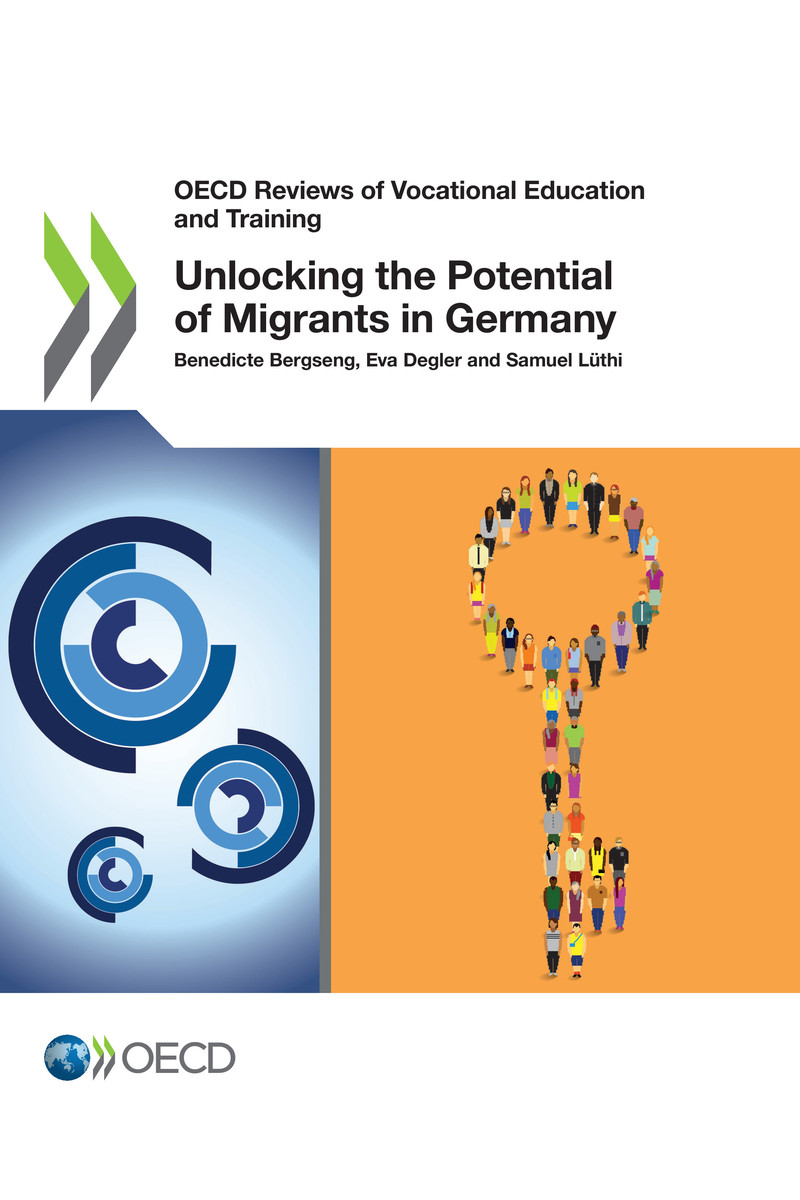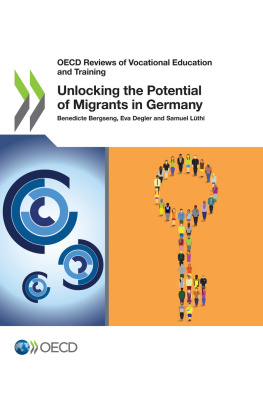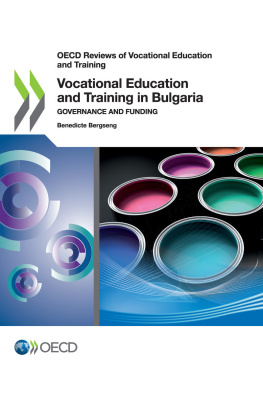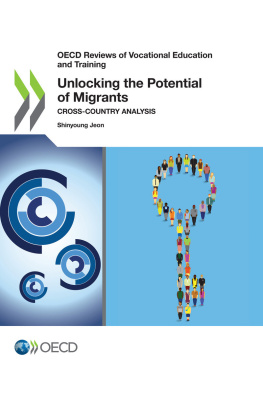Bergseng B. - Unlocking the Potential of Migrants in Germany
Here you can read online Bergseng B. - Unlocking the Potential of Migrants in Germany full text of the book (entire story) in english for free. Download pdf and epub, get meaning, cover and reviews about this ebook. year: 2019, publisher: OECD Publishing, genre: Home and family. Description of the work, (preface) as well as reviews are available. Best literature library LitArk.com created for fans of good reading and offers a wide selection of genres:
Romance novel
Science fiction
Adventure
Detective
Science
History
Home and family
Prose
Art
Politics
Computer
Non-fiction
Religion
Business
Children
Humor
Choose a favorite category and find really read worthwhile books. Enjoy immersion in the world of imagination, feel the emotions of the characters or learn something new for yourself, make an fascinating discovery.
- Book:Unlocking the Potential of Migrants in Germany
- Author:
- Publisher:OECD Publishing
- Genre:
- Year:2019
- Rating:3 / 5
- Favourites:Add to favourites
- Your mark:
- 60
- 1
- 2
- 3
- 4
- 5
Unlocking the Potential of Migrants in Germany: summary, description and annotation
We offer to read an annotation, description, summary or preface (depends on what the author of the book "Unlocking the Potential of Migrants in Germany" wrote himself). If you haven't found the necessary information about the book — write in the comments, we will try to find it.
Unlocking the Potential of Migrants in Germany — read online for free the complete book (whole text) full work
Below is the text of the book, divided by pages. System saving the place of the last page read, allows you to conveniently read the book "Unlocking the Potential of Migrants in Germany" online for free, without having to search again every time where you left off. Put a bookmark, and you can go to the page where you finished reading at any time.
Font size:
Interval:
Bookmark:

Bergseng, B., E. Degler and S. Lthi (2019), Unlocking the Potential of Migrants in Germany , OECD Reviews of Vocational Education and Training, OECD Publishing, Paris, https://doi.org/10.1787/82ccc2a3-en .
The German vocational education and training (VET) system is known and admired around the world for its ability to prepare young people for high skilled employment. In Germany, VET smooths transitions into work and is closely aligned with labour market demand. This report focuses on an unprecedented test of the German VET system: how to respond to the significant increase in migrants who arrived in the country in 2015-16.
When delivered effectively, VET is well-placed to enable integration. It delivers knowledge and skills in demonstrable employer demand enabling new relationships between people in workplaces. This study looks at the capacity of the German VET system to unlock the potential of migrants, focusing particularly on refugees and other individuals who are protected from deportation. It recognises that migrants present both opportunities and challenges for host countries. For a country with a rapidly ageing population and who is experiences skills shortages, Germany cannot ignore the opportunity presented by hundreds of thousands newly arrived young people. It cannot be taken for granted, however, that access to vocational education, and through it to skilled employment, will be easy. Young migrants face a number of barriers which prevent easy access to VET. They commonly lack familiarity and useful social networks linked to VET. They also often require additional support to build up the knowledge and skills, not least in language competency, to benefit from vocational education and ensure ultimate attractiveness to employers. By following learners through their journeys into, and through VET, it is possible to identify where targeted interventions are needed to enable progression.
The study is set in the context of a country which undertook remarkable efforts to scale up existing approaches and develop new initiatives aimed at enabling integration. VET has been fundamental to German integration policy, and many measures have made use of work-based learning. The integration of migrants is, however, as long-term project. Significant challenges remain. This report assesses the strength and challenges faced by Germany and suggests policy responses for how these challenges can be addressed. A particular focus is on recent migrants seeking humanitarian protection aged 16 to 35, but insights and implications for the integration of other migrant youth and native-born youth with migrant parents are drawn. The report complements a cross-national OECD study of how other countries, notably Switzerland, Sweden and Italy, have responded to similar challenges.
Chapter 1 introduces the study and sets out the challenges and opportunities presented by new migrants to German society. The chapter provides a snapshot of the German VET system and describes the key characteristics of immigrant youth in the VET system. The chapter lastly summarises the key strengths and challenges that the report has identified.
Chapters 2, 3 and 4 export the challenges that migrants can anticipate as they follow VET pathways in pursuit of a VET qualification and access to skilled work. Chapter 2 focuses on migrants getting ready for VET. Given the low status of VET in many origin countries, it is unsurprising that many perceive VET as undesirable. Proactive career guidance, informing migrants about VET opportunities, is an essential first step in bringing migrant learners into vocational education. Second, the chapter looks at how migrants build the necessary skills to enter VET. Most recent arrivals are in need of substantial support in order to get ready to benefit from upper secondary VET provision.
Chapter 3 looks at the growing difficulties faced by both native and foreign-born youth with migrant parents in securing an apprenticeship. Challenges include the weakness of social networks, getting employers on board and tackling discrimination in the apprenticeship market. Chapter 4 considers the need that many migrants have for additional support during training to enable them to complete VET qualifications. For many migrants, a major issue is weak language skills, which can have implications for their ability to follow the theoretical curriculum in VET schools.
Chapter 5 takes on system-wide topics related to how the VET system is governed. The entry of so many migrants into the country within such short time period represents an exceptional situation. The report looks into the systems ability to ensure policy coherence across a complex and largely devolved policy field, as well as how to enable peer learning and co-operation across the country. Chapter 6 explores opportunity for increased flexibility in the German VET system for all youth at risk of not being admitted into, or succeeding in, VET.
This report was drafted by Benedicte Bergseng from the OECD Centre for Skills and Eva Degler from the International Migration Division within the OECD Directorate for Employment, Labour and Social Affairs with Samuel Lthi within the OECD Centre for Skills. Shinyoung Jeon engaged with important inputs throughout the work. The project benefited considerably from the support of Rosa Neri. Jennifer Cannon, Elisa Larrakoetxea, and Charity Kome provided valuable administrative support. Lauren Thwaites provided valuable support in the editorial and production process.
The OECD would like to thank many colleagues in Germany for their constructive engagement throughout the study, and especially Oliver Diehl, Erik Hess and Peter Thiele at the Federal Ministry for Education and Research. German colleagues gave valuable inputs to early drafts of this report and co-organised visits to five Lnder , including a workshop held in Bremen that brought together policy makers, researchers and other colleagues from Germany, Switzerland, Norway and Sweden. The OECD would also like to thank colleagues from the Federal Institute for Vocational Education and Training (BIBB), and especially Mona Granato, who shared their rich knowledge on the topic. In addition, the OECD is grateful to the hundreds of stakeholders in Germany who shared their experiences and perceptions of strengths and challenges of vocational education as a means to integrate migrants.
Font size:
Interval:
Bookmark:
Similar books «Unlocking the Potential of Migrants in Germany»
Look at similar books to Unlocking the Potential of Migrants in Germany. We have selected literature similar in name and meaning in the hope of providing readers with more options to find new, interesting, not yet read works.
Discussion, reviews of the book Unlocking the Potential of Migrants in Germany and just readers' own opinions. Leave your comments, write what you think about the work, its meaning or the main characters. Specify what exactly you liked and what you didn't like, and why you think so.












